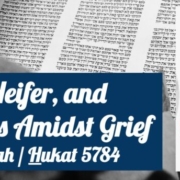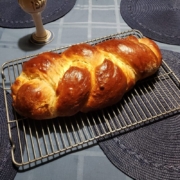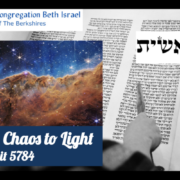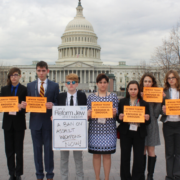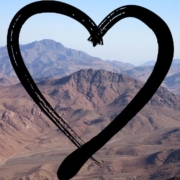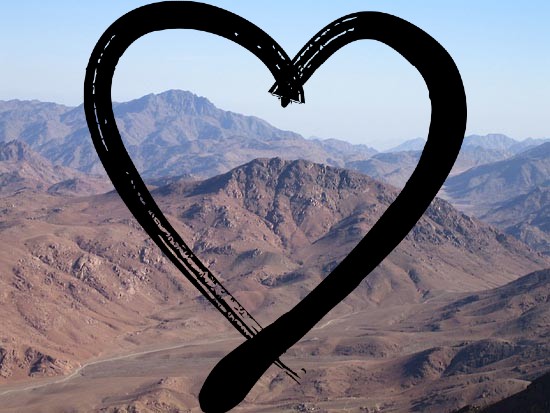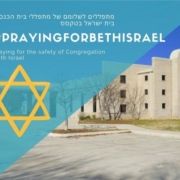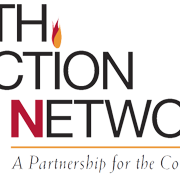“…In times like these I’m grateful that our tradition is built on hope that no matter how broken our world has been, and this year we’re all aware that it is plenty broken, a better future is possible. Even if I don’t know how we’re going to get there..”
On the festival of Shemini Atzeret (October 7), our world tilted on its axis. Dancing with the Torah that night felt like an act of resistance, connectedness, and hope, even amidst our tears.
“…The primordial light shines in the darkness not of space but of spirit. And when God declares it good, God is saying that there is capacity for good in this world. God is saying that we can choose to create, not just to destroy…”
I emerged from Shabbat to the news of the horrific shooting at a grocery store in a predominantly Black neighborhood in Buffalo. The shooter was motivated by racial hatred and by the so-called “great replacement theory” – the belief that Jews are orchestrating a “replacement” of white Americans with people of color. That same argument has motivated many shootings in houses of worship and elsewhere.
In this week’s Torah portion, Yitro, we receive Torah at Sinai. Tradition teaches that every Jewish soul that ever was and ever will be was present at Sinai. At Sinai we stood together as one.
This week some of you have told me that you feel more connected than usual to Jews in other places… especially the Jews of Congregation Beth Israel in Colleyville, Texas. That their shul shares our name heightens our sense of closeness.
Last Shabbat while members and the rabbi of that CBI community were held hostage, our hearts were in our throats and our prayers flowed without ceasing. Often a crisis makes us aware of the interconnectedness we usually don’t see. In a crisis, it’s easy to feel how what happens to one heart tugs at another heart, bound up as we are in what Dr. King called that “inescapable network of mutuality.”
What happens to you impacts me. What happens there impacts us here. That’s one of the continuing lessons of the pandemic. And this week, our connectedness means that many of us share a feeling of renewed vulnerability.
But we’re connected not only because of our shared vulnerability, our shared fears of antisemitism and attack. We’re connected because our souls stood together at Sinai. We’re connected through mitzvot. In Aramaic, Hebrew’s closest sister tongue, the word for connection is tzavta, which shares a root with mitzvah. The mitzvot connect us with God and with each other.
Some of those mitzvot are listed in this week’s Torah portion. Be in relationship with the Force of Liberation bringing us forth from life’s narrow places. Resist the urge to worship things that are not God, like statues or status. Remember the day of Shabbat and keep it holy, because when we pause our constant making and doing we are re-ensouled.
And some of the mitzvot our tradition holds dear aren’t in today’s list, because our tradition is comprised of 613 commandments, not just 10. For instance, the mitzvah repeated thirty-six times in Torah, instructing us in no uncertain terms to “Love the stranger, for you were strangers in the land of Egypt.” The rabbi at CBI Colleyville lived out that mitzvah when he invited an unknown man in on a twenty-degree morning and made him a cup of tea to help him get warm. We all know now how that turned out. And: I still think he was right to do it. Welcoming that stranger was the Jewish thing to do.
How do we do that in a way that keeps us safe as a community? That’s a big conversation, and it’s one we’ll be having for a while. There’s no simple answer to balancing the Jewish value of pikuach nefesh (protecting or preserving life) with the Jewish value of hachnasat orchim (welcoming others in hospitality). It’s another version of the core spiritual balancing act to which our tradition calls us, between gevurah and chesed — boundaries and lovingkindness.
It’s okay to feel afraid. It would be spiritually dishonest to pretend otherwise. When someone chooses to join the Jewish people, at the end of their beit din and just before immersion there’s a ritualized series of questions rooted in Talmud that I ask. They’re questions like: don’t you know that it’s sometimes hard to be Jewish? Don’t you know that being Jewish comes with obligations, and yeah, it also comes with antisemitism that will now be aimed at you?
But today I want to add: don’t you know that being Jewish is also joyous? Lighting Shabbat candles and letting the week’s worries slough away — telling our core story of liberation at the seder with songs and laughter — the heart-opening and mind-expanding journey of Jewish learning — feeding the hungry and clothing the naked and caring for the powerless — there’s so much beauty and meaning here.
All of these connect us with our cousins in Colleyville, and Squirrel Hill, and Poway, and all over the world. Antisemitism is real and it’s frightening and it probably isn’t ever going away. But the mitzvot, and our Jewish joy — they can’t take that away from us.
The commentator Rashi notes that when Torah describes our encampment at Sinai, it uses a singular verb to teach us that when we gathered at the base of that mountain we were like one being with one heart. We get another hint toward this a few verses later, where we read that the whole community answers יַחְדָּו֙ / yachdav, as one.
It’s easy to focus on all the things that divide us: different Jewish denominations, different ways of doing Jewish, different dress codes, different relationships with mitzvot or God or spiritual practice. But at Sinai we had a shared heart. And during last weekend’s crisis we felt our shared heart. May the shared heart that we felt while our cousins in Colleyville were in danger stay real for us, long after that danger is gone. And may that shared heart connect and sustain us through whatever comes.
This is the d’varling that R. Rachel offered at Kabbalat Shabbat services this week (cross-posted to Velveteen Rabbi.)
Dear Congregation Beth Israel community,
There is nothing quite like the gut-wrenching feeling of emerging from the peace of Shabbat — a day when some of us avoid the news or social media — into the news of violence in a synagogue, again. Thank God, after eleven tense and terrible hours the hostages were freed. But in a time when we may already be feeling vulnerable, because of pandemic and climate crisis, this attack may heighten our sense of fragility.
Some of us may be feeling especially vulnerable because the name of the synagogue in Colleyville, Texas matches our own. Congregation Beth Israel means house of Israel: house of our people, our family, our community that takes its name from Jacob who became Yisrael when he wrestled with an angel all night until dawn.
Every Jewish house of worship, and every Jewish community, is a house of Israel. We are the people Israel: all of us. And our tradition teaches “kol Yisrael arevim zeh bazeh:” all of Israel is responsible for one another. Or, phrased differently: we are all interconnected in a web of mutual responsibility and care.
Dr. Martin Luther King, Jr., to whom this weekend is dedicated, taught something similar. In his 1963 Letter from a Birmingham Jail, he wrote: “In a real sense all life is interrelated. All [of us] are caught in an inescapable network of mutuality, tied in a single garment of destiny. Whatever affects one directly, affects all indirectly.” (We will hear those words in haftarah trope at this afternoon’s Tu BiShvat Zoom seder.) What happened yesterday underscores this teaching. What happened in a suburb of Fort Worth, Texas, impacts all of us everywhere.
After the Tree of Life massacre in Pittsburgh, CBI received a grant to upgrade our security. The CBI Board and I will talk about any further work we may need to do to keep our community safe when the pandemic permits us to gather once again in our beautiful building.
And I’ve learned from colleagues that CBI Colleyville let the shooter in because they presumed he was homeless and needed help. In so doing, they were living out some of our highest Jewish values. I don’t know how best to keep our community safe while also keeping our spiritual doors open to those in need, but I know that together we will work to find that balance.
Some of us may recall that after the Pittsburgh shooting, CBI also received a driveway full of love: posters and artworks and signs assuring us that we are welcome here, that the greater North Adams community stands with us, that we are loved and our neighbors want us to be safe. Even as we physically “harden” our building against attack, our spiritual tradition calls us to keep our hearts soft: to connect with each other, to cultivate emotional openness, to remember that we are all interconnected.
I am here if any of you need to talk. I am holding each of you in my heart. May the spiritual sap rising this Tu BiShvat fuel the growth of hope, and compassion, and safety for all.
Blessings —
Rabbi Rachel
Today is an interfaith National Day of Mourning and Lament for the more than 100,000 victims of COVID-19 in our nation and many more around the world. We mourn the suffering and loss of life in this pandemic and grieve that much of the pain and bereavement has struck communities of color and low income. Our hearts go out to all affected.
At 12 noon and at 5pm today, we invite you to pause to remember and reflect, and to hold the victims of this pandemic and the victims of racism in your hearts and prayers. At noon, the church bells of St. John’s, and at 5pm, the bells of First Congregational in Williamstown will sound in sorrow.
From 5:00 to 5:30 pm people will stand 10 feet apart, wearing masks, to line Main Street/Route 2 in Williamstown, holding signs of prayer, grief, and solidarity in the wish for renewal. Rabbi Rachel will be among them.
May the Source of Peace bring comfort to all who are bereaved, and strengthen us in our pursuit of justice and healing for all.

